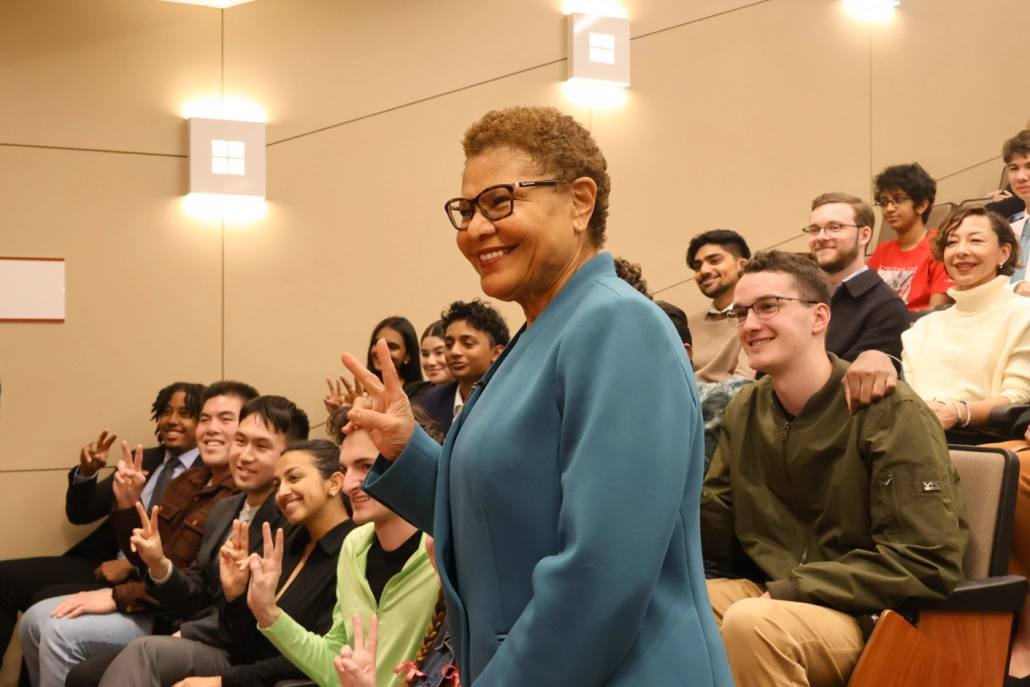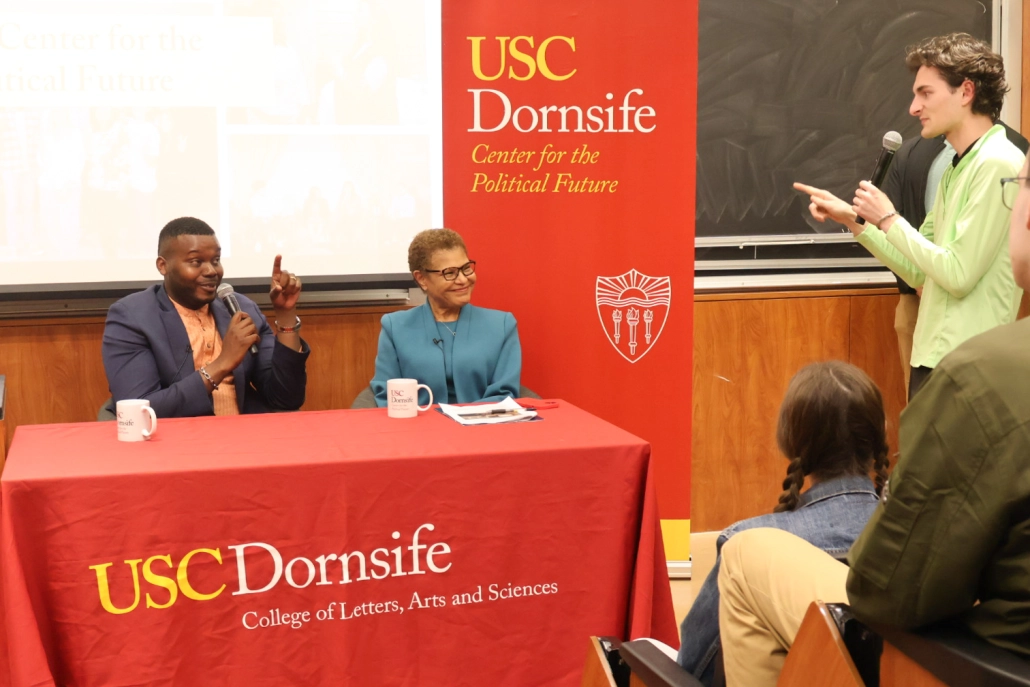Bass speaks on mayoral lessons learned
Karen Bass discussed her experiences as mayor on campus Tuesday evening.
Karen Bass discussed her experiences as mayor on campus Tuesday evening.

The USC Center for the Political Future welcomed Los Angeles Mayor Karen Bass to campus Tuesday evening for a conversation about her experiences as a mayor. Michael Tubbs, the former mayor of Stockton and a Spring 2024 CPF fellow, hosted the event in Stauffer Science Lecture Hall.
Tubbs began the conversation by asking Bass about her journey from being a college student to being mayor, stopping to work in healthcare, education, the California State Assembly and Congress. Bass replied saying she initially didn’t view politics as a career while she worked as a faculty member at the Keck School of Medicine in the 1980s.
“When I was in middle school is when I first started getting involved [politically] and knew that I wanted to spend my life fighting for justice. But how? I didn’t know,” Bass said. “After work, I was politically active because in the time period I was growing up, this was not a job … So, my political work was always as a volunteer.”
Bass then described how during her time as a faculty member at the Health Science Campus in the ’80s, she watched mass incarceration grow as cocaine hit the streets, causing issues that she said were social, economic and health problems. Still, politicians focused solely on passing legislation that would incarcerate people. She said this injustice prompted her to launch Community Coalition in 1990, a grassroots organization working to achieve racial and economic justice.
“When I started Community Coalition, I had no idea what I was doing,” Bass said. “A lot of times, young folks, they think that they need to be trained to do everything they do, or they need to take a class, or they need to go get another degree. Sometimes, you just do and learn along the way.”
Bass said not having experience working for the city gave her a different perspective on issues in the local government system when she became mayor in 2022. She said her background as a healthcare provider gave her a unique angle to help deal with what she said was the biggest challenge of combating homelessness in the city: a lack of adequate services like healthcare and rehabilitation programs.
She said previous politicians had not been devoted to ending homelessness, as people were made to live outside in tents for months while a housing structure was being built, which she found “unacceptable.” Her background in the medical field helped her understand that unhoused people needed immediate medical attention and meetings with social workers — and foremost, to find temporary housing.
“People that have done this work over the years are experts in housing but not necessarily experts in the people that need to be housed,” Bass said.

Oscar Paz — who runs his own nonprofit working to help provide students with free educational resources, called the Oscar Paz Institute — attended Tuesday’s talk and said he admired how Bass dove headfirst into her task.
“You have a lot of previous mayors who spend their whole time outlining what they’re going to do, and she just said, ‘here’s what’s going to happen now,’” Paz said. “The fact that steps are actually being taken shows exponential growth as opposed to previous years.”
Bass compared her experience attempting to meet the immediate needs of people experiencing homelessness to “peeling an onion” and finding a new problem with every layer she stripped away. She said the reason she managed to keep finding innovative approaches to tackling large-scale problems like homelessness without causing issues in a frustrating bureaucracy was by never attacking or disparaging people and using “positive pressure” instead of “negative pressure.”
She said one of the strategies that has helped her implement changes is seeking out voices in the community, especially those who don’t support her, to ensure her policies reflect the opinions of her constituency. In 2022, she launched the Inside Safe program to provide temporary housing for people living in tents and encampments. She said she did not let the challenges she experienced hinder her motivation.
“I could literally fill up your entire hour telling you all of the pitfalls. But just because there’s all these pitfalls, you don’t stop,” Bass said. “I’m going to keep getting people off the street and keep fighting to improve the [city’s homelessness] program at the same time.”
Elizabeth Farrington, a junior majoring in political science, said it was “refreshing” to hear how diligently Bass handled her role as mayor and how optimistic she was.
“You can tell that she really enjoys the work that she does. She also has a very realistic perspective of how long it takes to implement policy,” Farrington said. “She was generally a really great person to listen to.”
Bass closed the event by advising the younger generation to interact with voters and their communities in person rather than over social media to create more meaningful and personal connections.
“If you want to bring about change, if you want to have power, you want to bring everybody together,” Bass said. “It really comes down to simple arithmetic. You’re obviously a lot more powerful in a coalition than you would be individually.”
She encouraged students to make use of the opportunities to get involved in the local government in hopes of making sure the next generation is prepared to lead.
Shiva Kumar, a senior studying business administration, said he liked that Bass was more “hands-on” in her approach to dealing with homelessness by meeting with community members in L.A. as compared to other politicians, getting involved directly instead of handling it legislatively behind closed doors.
“I appreciate, as someone who’s a [leader], she was willing to pull no punches and just say it like it is but also project optimism and a plan for the future and [have a] willingness to admit that she’s not always right about everything, which is a rare but important trait in a good politician,” Kumar said.
We are the only independent newspaper here at USC, run at every level by students. That means we aren’t tied down by any other interests but those of readers like you: the students, faculty, staff and South Central residents that together make up the USC community.
Independence is a double-edged sword: We have a unique lens into the University’s actions and policies, and can hold powerful figures accountable when others cannot. But that also means our budget is severely limited. We’re already spread thin as we compensate the writers, photographers, artists, designers and editors whose incredible work you see in our daily paper; as we work to revamp and expand our digital presence, we now have additional staff making podcasts, videos, webpages, our first ever magazine and social media content, who are at risk of being unable to receive the support they deserve.
We are therefore indebted to readers like you, who, by supporting us, help keep our paper daily (we are the only remaining college paper on the West Coast that prints every single weekday), independent, free and widely accessible.
Please consider supporting us. Even $1 goes a long way in supporting our work; if you are able, you can also support us with monthly, or even annual, donations. Thank you.
This site uses cookies. By continuing to browse the site, you are agreeing to our use of cookies.
Accept settingsDo Not AcceptWe may request cookies to be set on your device. We use cookies to let us know when you visit our websites, how you interact with us, to enrich your user experience, and to customize your relationship with our website.
Click on the different category headings to find out more. You can also change some of your preferences. Note that blocking some types of cookies may impact your experience on our websites and the services we are able to offer.
These cookies are strictly necessary to provide you with services available through our website and to use some of its features.
Because these cookies are strictly necessary to deliver the website, refusing them will have impact how our site functions. You always can block or delete cookies by changing your browser settings and force blocking all cookies on this website. But this will always prompt you to accept/refuse cookies when revisiting our site.
We fully respect if you want to refuse cookies but to avoid asking you again and again kindly allow us to store a cookie for that. You are free to opt out any time or opt in for other cookies to get a better experience. If you refuse cookies we will remove all set cookies in our domain.
We provide you with a list of stored cookies on your computer in our domain so you can check what we stored. Due to security reasons we are not able to show or modify cookies from other domains. You can check these in your browser security settings.
These cookies collect information that is used either in aggregate form to help us understand how our website is being used or how effective our marketing campaigns are, or to help us customize our website and application for you in order to enhance your experience.
If you do not want that we track your visit to our site you can disable tracking in your browser here:
We also use different external services like Google Webfonts, Google Maps, and external Video providers. Since these providers may collect personal data like your IP address we allow you to block them here. Please be aware that this might heavily reduce the functionality and appearance of our site. Changes will take effect once you reload the page.
Google Webfont Settings:
Google Map Settings:
Google reCaptcha Settings:
Vimeo and Youtube video embeds:
The following cookies are also needed - You can choose if you want to allow them:
